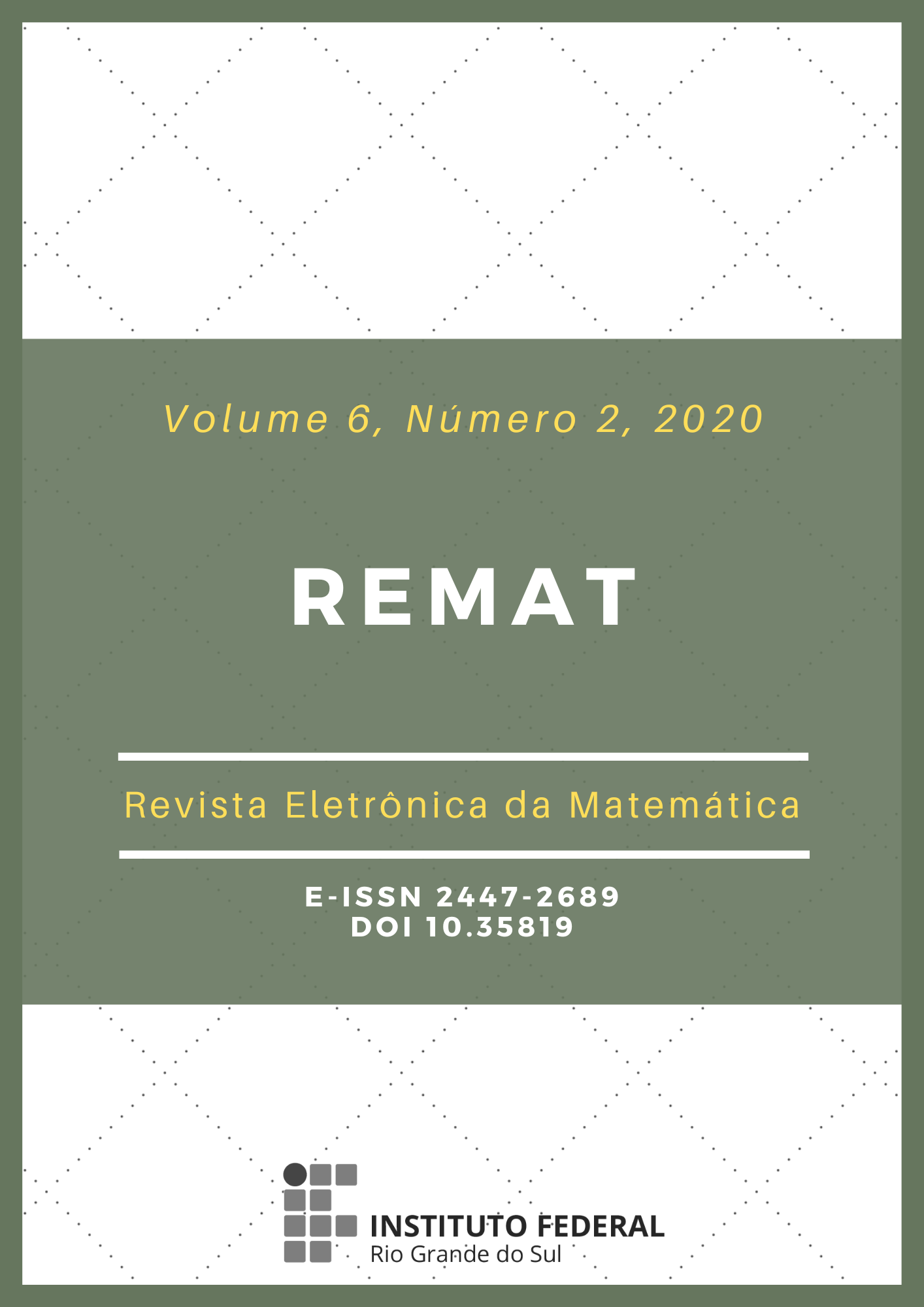Considerations about validations methods of virtual games in teaching and learning of Mathematics
DOI:
https://doi.org/10.35819/remat2020v6i2id3909Keywords:
Mathematical Software, Games, Aided Tool, Efficiency, ValidationsAbstract
This work aims to make a literature review about how the virtual games validations are realized in the teaching and learning process in Mathematics Subject. For this purpose, research was realized with the keywords: virtual games; Mathematics; teaching, in both Portuguese and English, through the platforms Scopus, IEEE Xplore and Elsevier, searching for papers published from 2005 to 2019. It was found in hundreds of works, and after reading the abstracts, only 20 were selected. Among these papers were articles, dissertations, theses, and books that deal with games, in national and international level. The selected papers were divided into three categories: a) traditional games applied in any subject; b) traditional games in Mathematics teaching; c) application of virtual games in Mathematics teaching. In this last category, four articles were selected to verify which methodologies were used to validate the data obtained from the virtual games application. The results indicated that, in most cases, the data are subjected to basic statistics, such as position´s measures and relative frequency. In addition, data appeared from the Shapiro Wilk test, Nielsen Usability and Cognitive Path Method. One of the analyzed articles did not present how the data validation process was developed. In general, it proved the effectiveness of using virtual games in Mathematics teaching.
Downloads
References
ARANHA, G. O processo de consolidação dos jogos eletrônicos como instrumento de comunicação e de construção de conhecimento. Ciências & Cognição, Rio de Janeiro, v. 3, ano 1, p. 21-62, nov. 2004. Disponível em: http://www.cienciasecognicao.org/revista/index.php/cec/article/view/473. Acesso em: 16 mar. 2019.
BARBOSA NETO, J. F.; FONSECA, F. S. da. Jogos educativos em dispositivos móveis como auxílio ao ensino da matemática. RENOTE: Revista Novas Tecnologias na Educação, Porto Alegre, v. 11, n. 1, jul. 2013. DOI: https://doi.org/10.22456/1679-1916.41623.
BARROS, M. L. L.; ANGELIM, C. P. O Uso dos Jogos no Ensino da Matemática. Id on Line: Revista Multidisciplinar e de Psicologia, Jaboatão dos Guararapes, v. 11, n. 39, p. 452-458, 2017. DOI: https://doi.org/10.14295/idonline.v12i39.1004.
BOYER, C. B. História da Matemática. 2 ed. São Paulo: Edgard Blücher, 1996.
CURY, H. N. Disciplinas Matemáticas em Cursos Superiores: reflexões, relatos, propostas. Porto Alegre: EDIPUCRS, 2004.
D'AMBROSIO, U. Etnomatemática: arte ou técnica de explicar e conhecer. São Paulo: Ática, 1990.
DINELLO, R. Os jogos e as ludotecas. Santa Maria: Pallotti, 2004.
FALKEMBACH, G. M. O lúdico e os jogos educacionais. 2007. Universidade Federal do Rio Grande do Sul. Disponível em: http://penta3.ufrgs.br/midiasedu/modulo13/etapa1/leituras/arquivos/Leitura_1.pdf. Acesso em: 16 mar. 2019.
FOERSTER, K. T. Teaching spatial geometry in a virtual world: Using minecraft in mathematics in grade 5/6. 2017 IEEE Global Engineering Education Conference (EDUCON), Athens, p. 1411-1418, june 2017. DOI: https://doi.org/10.1109/EDUCON.2017.7943032.
FREUD, Sigmund. Obras Completas. Rio de Janeiro: Imago, 1969.
GROENWALD, C. L. O.; TIMM, U. T. Utilizando Curiosidades e Jogos Matemáticos em Sala de Aula. Só Pedagogia, Virtuous Tecnologia da Informação, 9 jul. 2008. Disponível em: http://www.pedagogia.com.br/artigos/jogoscuriosidades/. Acesso em: 10 ago. 2020.
HUIZINGA, J. Homo Ludens: o jogo como elemento da cultura. 2 ed. Trad.: MONTEIRO, João Paulo. São Paulo: Perspectiva, 1990.
KEBRITCHI, M.; HIRUMI, A.; BAI, H. The effects of modern mathematics computer games on mathematics achievement and class motivation. Computers & Education, v. 55, n. 2, p. 427-443, set. 2010. DOI: https://doi.org/10.1016/j.compedu.2010.02.007.
MELO, D. S. de; PIRES, F. G. S; FERREIRA, R. M; SILVA JÚNIOR, R. J. R. Robô Euroi: jogo de estratégia Matemática para exercitar o Pensamento Computacional. Brazilian Symposium on Computers in Education (Simpósio Brasileiro de Informática na Educação ? SBIE), p. 685, out. 2018. DOI: http://dx.doi.org/10.5753/cbie.sbie.2018.685.
MOTA, P. C. C. L. de M. Jogos no Ensino da Matemática. 2009. 142 f. Dissertação (Mestrado em Matemática/Educação) ? Universidade Portucalense, Porto, Portugal, 2009.
PRENSKY, M. Não me atrapalhe mãe – estou estudando. São Paulo: Phorte, 2010.
SANTOS, W. O. dos; SANTANA, S. J. de. Os Jogos Digitais São Realmente Melhores que os Jogos Tradicionais para Ensinar Matemática? Uma Análise sob a Concentração dos Estudantes. RENOTE: Revista Novas Tecnologias na Educação, Porto Alegre, v. 16, n. 1, jul. 2018. DOI: https://doi.org/10.22456/1679-1916.85906.
YUSTE, F. C; SALLÁN, J. M. Juegos en clase de matematicas. Cuadernos de Pedagogia, n. 160, p. 50-51, 1988. Disponível em: https://dialnet.unirioja.es/servlet/articulo?codigo=2769007. Acesso em: 10 ago. 2020.
Downloads
Published
Issue
Section
License
Copyright (c) 2020 REMAT: Revista Eletrônica da Matemática

This work is licensed under a Creative Commons Attribution 4.0 International License.
REMAT retains the copyright of published articles, having the right to first publication of the work, mention of first publication in the journal in other published media and distribution of parts or of the work as a whole in order to promote the magazine.
This is an open access journal, which means that all content is available free of charge, at no cost to the user or his institution. Users are permitted to read, download, copy, distribute, print, search or link the full texts of the articles, or use them for any other legal purpose, without requesting prior permission from the magazine or the author. This statement is in accordance with the BOAI definition of open access.













 https://orcid.org/0000-0002-0893-7426
https://orcid.org/0000-0002-0893-7426


















